Good morning!
Greetings in the name of the father, the son, and the Holy Spirit.
Praying for you, your family, your community, and the rest of the world. Right now, the whole world is suffering because of the Coronavirus (COVID-19). Let’s pray together to God, Our Ever-Loving Father, His mercy and protection on all, and God’s healing on those who are infected by the COVID-19. We all believe God’s grace and love rest on all who look upon Him every moment with faith in Him.
He who did not spare his own Son, but gave him up for us all—how will he not also, along with him, graciously give us all things? (Romans 8:32)
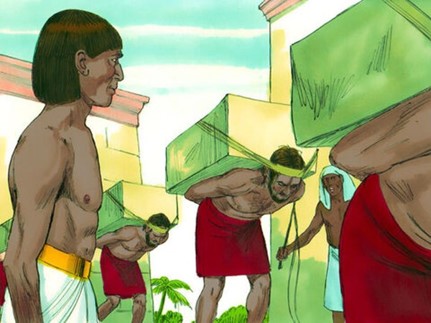
Moses had a great mission in his heart for his own people in slavery. Although He was among them, God chose him to be one of the princes of Egypt. It is also almost amusing how Moses became Pharaoh’s prince because Pharaoh himself caused it.
Pharaoh, the king of Egypt, feared the Israelites living in Egypt. Their population grew rapidly, and the Israelites were too numerous for Egypt while being a major threat. To subdue the population growth, Pharaoh enslaved them and made them do forced labor under the Egyptians. However, this scheme did not work. Then he gave orders to midwives to kill all male newborn babies as they were born while letting female babies live. However, the midwives feared God more than Pharaoh, and they did not obey Pharaoh’s vicious order.
Pharaoh soon summoned the midwives, but they lied to Pharaoh, “The Israelite women are not like the Egyptian women. They are more vigorous and have their babies so quickly that we cannot get there in time.” And God protected the midwives from Pharaoh. Pharaoh could not do anything to the midwives.
Then Pharaoh ordered all his soldiers: “Throw every newborn Israelite boy into the Nile River. But you may let the girls live.” Then his soldiers visited each Israelite household, forcefully separated male babies from their parents, and killed them. Finally, Pharaoh saw that his plan worked. He finally said, “I have successfully managed to control the Israelites’ population growth.”
However, Pharaoh missed one critically important fact in his own royal family. Due to Pharaoh’s order, Moses’ parents hid Moses and nurtured him. But they found that they could no longer hide Moses. So they put him in a basket and sent him down through the Nile River. Pharaoh’s daughter came out for a bath and found the basket. She opened up the basket and saw an Israelite baby. She felt pity for Moses in the basket and grabbed Moses out of the basket. She searched for an Israelite woman to nurture Moses. Per God’s divine appointment, she found Moses’ biological mother as her nursing woman. Without knowing this, she gave money to Moses’ mother to nurture Moses. Later, when the boy was older, his mother brought him back to Pharaoh’s daughter, who adopted him as her own son. Pharaoh’s daughter brought Moses to the palace, and Moses grew up with Pharaoh’s princes without Pharaoh’s knowledge.
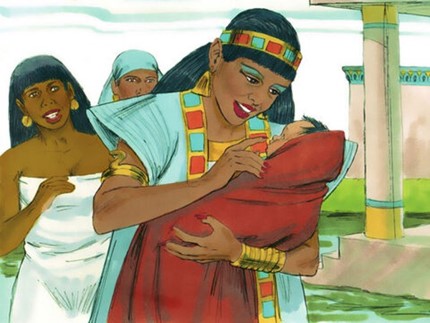
For the foolishness of God is wiser than human wisdom, and the weakness of God is stronger than human strength. (1 Corinthians 1:25)
God was always with Moses and blessed Moses. After being adopted as Pharaoh’s prince, Moses received the best education and the best training in Egypt, which was the best in the world. Any of his fellow Israelites could not even imagine what Moses received. Moses also excelled in all aspects over the other princes in the palace. He was the top prince whom all loved, including Pharaoh himself. However, Moses had never forgotten about his own people in slavery. His Israelite mother nurtured Moses, and her mother’s influence had never left him. Moses believed God chose him and equipped him with Egypt’s best to do God’s will – liberating his fellow Israelites from slavery.
As he realized his life purpose, Moses lived for the purpose and patiently waited while searching for an opportunity to liberate his fellow Israelites in slavery. One day, he went out to visit his own people, the Israelites, and he saw how hard their lives were. He saw an Egyptian beating one of his fellow Israelites during his visit. After looking in all directions to ensure no Egyptian was watching, Moses killed the Egyptian and hid the body in the sand. Moses immediately thought that it was the perfect opportunity to ignite the long-dreamed liberation movement among his fellow Israelites and position him the leader. Moses believed he ignited the fire to liberate his people from slavery.
The next day, when Moses went out to visit his people again, he saw two Hebrew men fighting. “Why are you beating up your friend?” Moses said to the one who had started the fight.
The man replied, “Who appointed you to be our prince and judge? Are you going to kill me as you killed that Egyptian yesterday?”
Great fear fell on Moses. He thought that all Israelites would follow him after seeing what he had done the previous day, and then he would lead them to the path to liberation from their slavery. The reality was completely opposite. His own people did reject Moses.
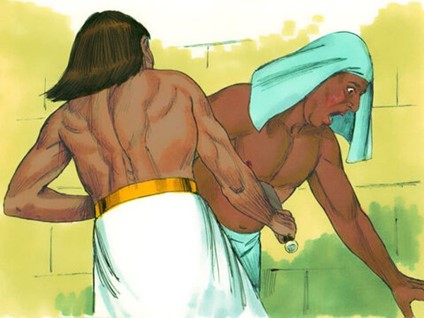
Soon Pharaoh heard what had happened, and he ordered his soldiers to capture and kill Moses. Moses hurriedly fled from Pharaoh and went deep into the wilderness of Midian. One day Moses, the top prince, became a fugitive. None of his fellow princes supported him and showed their cold backs to Moses as his fellow Israelites did.
Moses believed and acted on his belief, but the outcome was what he expected, but a miserable failure. So far, Moses had never lost to anyone, including all the other princes in the palace. Moses was the best in Egypt who always succeeded. Now, Moses walked aimlessly through the wilderness. His lifelong goal was completely shattered. Moses just wandered while making all efforts to forget and erase all of his past – all those triumphant successes, his vision to save his fellow Israelites, and the final failure that he believed and acted upon. He did not do for himself but his fellow people in slavery.
Moses aimlessly wandered in the wilderness, but God was with Moses, wherever Moses went or whether Moses felt God’s presence or not. God dearly loved Moses even more so as Moses’ life was completely shattered, and Moses lived in his misery of the first greatest failure ever. Moses felt that nothing was left in him. He even attempted to terminate his miserable life, but he could not actually do at the last moment. Indeed, God held Moses tight. God loved Moses more than ever, and God led Moses, although Moses did not know. God kept Moses going. God had never given up. God’s glorious plan was before Moses, although Moses did not know.
Indeed, there was a real difference between God’s plan and Moses’s understanding and belief. Then God led Moses to a well, and Moses sat down beside it. The priest of Midian had seven daughters who came, as usual, to draw water and fill the water troughs for their father’s flocks. But some other shepherds came and chased them away. So Moses jumped up and rescued the girls from the shepherds. Moses was the best-trained warrior in Egypt, and for him, it was a piece of cake to confront and push away the other hostile shepherds. Then Moses courteously drew water for their flocks.
When the girls returned to Reuel, their father, he asked, “Why are you back so soon today?”
“An Egyptian rescued us from the shepherds,” they answered. “And then he drew water for us and watered our flocks.”
“Then where is he?” their father asked. “Why did you leave him there? Invite him to come and eat with us.”
Moses accepted the invitation, and he settled there with him. In time, Reuel gave Moses his daughter Zipporah to be his wife. Later she gave birth to a son, and Moses named him Gershom, for he explained, “I have been a foreigner in a foreign land.” Moses’ heart was still with his fellow Israelites in slavery, although his people rejected Moses.
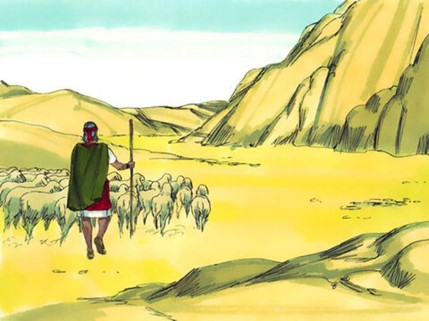
Years passed, and the king of Egypt died. But the Israelites continued to groan under their burden of slavery. They cried out for help, and their cry rose up to God. God heard their groaning, and he remembered his covenant promise to Abraham, Isaac, and Jacob. God looked down on the people of Israel and knew it was time to act, which was 40 years after Moses fled from Egypt.
By that time, Moses had become a completely different person. He was a humble shepherd in the land of Midian. Every day, he tendered sheep and loved his family. Daily Moses faithfully took care of his family and his sheep. He no longer remembered what had happened in Egypt because it was no longer a part of him. Moses was content with his new shepherd life with his loving family and sheep. God saw Moses, who was now ready for the next stage of his life.
One day Moses was tending the flock of his father-in-law, Jethro, the priest of Midian. He led the flock far into the wilderness and came to Sinai, the mountain of God. There the angel of the LORD appeared to him in a blazing fire from the middle of a bush. Moses stared in amazement. Though the bush was engulfed in flames, it didn’t burn up. “This is amazing,” Moses said to himself. “Why isn’t that bush burning up? I must go see it.”
When the LORD saw Moses coming to take a closer look, God called to him from the middle of the bush, “Moses! Moses!”
“Here I am!” Moses replied.
“Do not come any closer,” the LORD warned. “Take off your sandals, for you are standing on holy ground. I am the God of your father—the God of Abraham, the God of Isaac, and the God of Jacob.” When Moses heard this, he covered his face because he was afraid to look at God. Moses finally met God face to face.
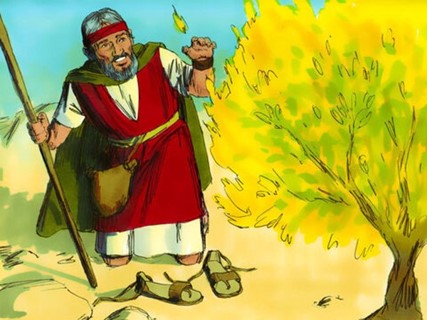
Then the LORD told him, “I have certainly seen the oppression of my people in Egypt. I have heard their cries of distress because of their harsh slave drivers. Yes, I am aware of their suffering. So I have come down to rescue them from the power of the Egyptians and lead them out of Egypt into their own fertile and spacious land. It is a land flowing with milk and honey—the land where the Canaanites, Hittites, Amorites, Perizzites, Hivites, and Jebusites now live. Look! The cry of the people of Israel has reached me, and I have seen how harshly the Egyptians abuse them. Now go, for I am sending you to Pharaoh. You must lead my people Israel out of Egypt.”
But Moses, who experienced the disastrous failure before, protested to God, “Who am I to appear before Pharaoh? Who am I to lead the people of Israel out of Egypt?”
Moses was even able to see clearly what happened forty years ago. It was so vivid that he could have touched the people in his view, which was a traumatic experience. The long-forgotten memory came back and consumed Moses at the spot. The Israelites, whom Moses helped to get out of their slavery, were arguing with and accusing Moses. Moses’ good deed to wake up his people from living passively in slavery was backfired. Moses’ painful memory froze Moses, but he put all his energy together and responded to God.
God answered, “I will be with you. And this is your sign that I am the one who has sent you: When you have brought the people out of Egypt, you will worship God at this very mountain.”
When my children were small, they did not know I was always with them, but they truly wanted to see me with their eyes to be comforted. God did the same for Moses What a loving and caring Father God to Moses! Indeed, God was always with Moses, but God told Moses once more to comfort Moses.
Indeed, God also knew Moses would protest. But God patiently approached Moses, who refused to take the same mission again. Moses believed the exact same mission in Egypt, acted on it, and failed miserably. Why was Moses living in the land of Midian instead of in the palace in Egypt? Because of the mission to rescue his fellow Israelites. Moses could not take the mission again. However, God saw His new Moses who was capable of doing God’s mission perfectly. There was no more Moses who used to be so competent with earthly power and strength for the liberating mission. At that time, Moses had never had the slightest doubt of failure. Now, Moses no long relied on his past earthly strength and power. To God, it was evident that Moses was ready for God’s mission. There was no more humanly competence in Moses.
Then Moses said, “If I go to the people of Israel and tell them, ‘The God of your ancestors has sent me to you,’ they will ask me, ‘What is his name?’ Then what should I tell them?”
Moses finally relied on God, not his own power and strength. He needed God, and he wanted to tell his fellow Israelites that God sent him again. Then he needed the name of God to convince his fellow Israelites.
God replied to Moses, “I Am Who I Am. Say this to the people of Israel: I Am has sent me to you.” God also said to Moses, “Say this to the people of Israel: Yahweh, the God of your ancestors—the God of Abraham, the God of Isaac, and the God of Jacob—has sent me to you
This is my eternal name,
my name to remember for all generations.
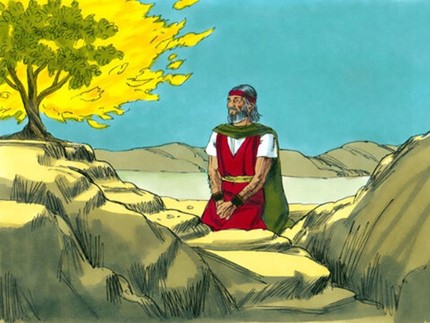
“Now go and call together all the elders of Israel. Tell them, ‘Yahweh, the God of your ancestors—the God of Abraham, Isaac, and Jacob—has appeared to me. He told me, “I have been watching closely, and I see how the Egyptians are treating you. I have promised to rescue you from your oppression in Egypt. I will lead you to a land flowing with milk and honey—the land where the Canaanites, Hittites, Amorites, Perizzites, Hivites, and Jebusites now live.”’
“The elders of Israel will accept your message. Then you and the elders must go to the king of Egypt and tell him, ‘The LORD, the God of the Hebrews, has met with us. So please let us take a three-day journey into the wilderness to offer sacrifices to the LORD, our God.’
God informed that God worked out the hearts of the Israelites, who now wanted to leave Egypt to make a journey to the promised land. Again, the Promised Land was not empty and waiting for Israelites to occupy. Even so, they wanted to leave slavery in Egypt to the Promised Land. Their slavery was so harsh for the last forty years, and their hearts were ready for a leader like Moses. It a little bit comforted Moses, but it did not mean all things were ready for Moses. There was still Pharaoh, the king of Egypt, who would not let the Israelites go. God, then, explained how God would deal with Pharaoh.
“But I know that the king of Egypt will not let you go unless a mighty hand forces him. So I will raise my hand and strike the Egyptians, performing all kinds of miracles among them. Then, at last, he will let you go. And I will cause the Egyptians to look favorably on you. They will give you gifts when you go so you will not leave empty-handed. Every Israelite woman will ask for articles of silver and gold and fine clothing from her Egyptian neighbors and from the foreign women in their houses. You will dress your sons and daughters with these, stripping the Egyptians of their wealth.”
Yes, God promised Moses to strike the truly stubborn king of Egypt, Pharaoh, with His mighty hand. Although Pharaoh would not initially let the Israelites go, eventually, he would let all the Israelites go. That’s not all. God’s fear would fall on the Egyptians, and they would give all good things to the departing former slaves who worked so hard for them. Finally, God’s justice would prevail in the land of Egypt after 400 years, which was truly long years.
During the past 400 years, the Israelites felt that their lives were miserable and had truly difficult times under the Egyptians, but God was always with them. Each step by step, God guided them to increase as numerous as the stars in the sky God promised with Abraham.
God made them multiply even in Egypt, and then the Israelites became a great threat to the Egyptians. Only 70 people came into Egypt, but they became 600,000 men. Yes, men only. If women and children were also counted, the population would easily reach 2,000,000. Scientist says we can see about 6,000 stars with our naked eyes. Certainly, God exceeded the promise made with Abraham!
When we are in a difficult time in our lives, it is time to count God’s blessing. But we should not count his blessing with our earthly measure. If not, we will certainly be disappointed. Or even we feel that God does not care at all or God does not exist at all. No. God is always with us and walks with us wherever we feel God’s presence or not.
No matter what happens in our lives, God is with us.
When his fellow people rejected Moses, God was with Moses. When Moses fled to the wilderness of Midian, God was with Moses. When Moses became a shepherd in the foraging land, God was there with Moses. When Moses got his son, he named “Gershom,” meaning “I have been a foreigner in a foreign land.” God was there with Moses. God tightly held Moses’ hand. Moses did not know, but God’s strength and power kept him going.
The greatest failure in Egypt caused incredible pains in Moses, which was so severe Moses took forty years to forget the miserable pain. Whether Moses felt God’s hand or not, God carefully watched over Moses with His loving hand. God kept carefully looking deep into Moses’ heart.
For 40 years, God patiently walked with Moses, and Moses was restored and reborn as a new man who could carry out God’s plan humbly and obediently. What a contrast between Moses 40 years ago, filled with earthly confidence and skills, and Moses, filled with humility and obedience as an unknown shepherd in the land of Midian. However, with the long journey with Moses, God carved out the new Moses who was able to overcome his traumatic failure and fulfill God’s will in the way that God planned.
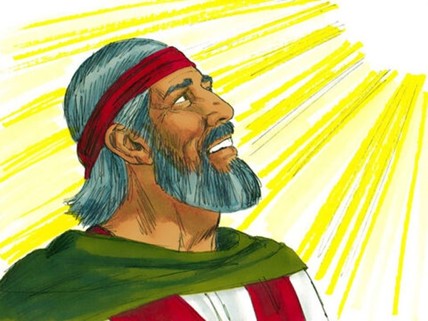
During the past 40 years, Moses watched over his flock. While tending and feeding his flock, Moses learned a secret relationship between shepherd and sheep. He learned patience and practiced his love for his sheep regardless of whether his sheep understood his patient love or not.
God is always patient with His children, as God was patient with Moses for forty years with His love. God steadily transformed Moses into the leader who could lead the Israelites from their slavery with patience and love as he experienced as a shepherd while tending his sheep. God also prepared the hearts of the Israelites in Egypt. Omnipotent God prepared both Moses and the Israelites, and God initiated His holy plan by calling Moses.
Our God is the Ever-Loving Father, who dearly loves us more than anything else. And God always walks us. As we know this truth, we can fix our eyes on Him under all circumstances, especially when we miserably fail because it is a part of God’s holy plan specifically prepared for us even before laying the foundation of the universe.
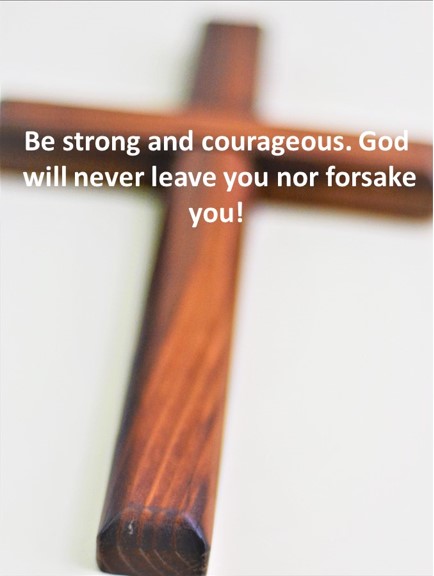
“Be strong and courageous. Do not be afraid or terrified because of them, for the Lord your God goes with you; he will never leave you nor forsake you.” (Deuteronomy 31:6)
